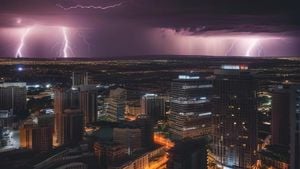Following recent escalations, tensions between Russia and Ukraine have reached new heights, particularly after President Biden's decision to permit Ukraine to launch strikes inside Russian territory using Western-supplied long-range missiles. This bold move has sparked fury within Russia, triggering strong statements from various Russian officials, including politicians and military leaders. They have characterized the U.S. decision as the onset of dangerous provocations, potentially leading to catastrophic consequences.
Russian officials have reacted sharply to Biden's decision, with Leonid Slutsky, head of the pro-Kremlin Liberal-Democratic Party, warning of serious repercussions and calling it "an unprecedented step toward World War Three." The Russian government newspaper Rossiyskaya Gazeta labeled this decision as reckless and indicative of Joe Biden's uncalculated approach, heightening fears of conflict escalation.
The crux of the problem lies not just with the military hardware, but also with the strategic interpretations both sides employ. Historically, Russia has consistently warned against any Western support allowing Ukraine to strike deep within its borders. Just last September, President Vladimir Putin cautioned officials not to permit such developments, stating it could be viewed as direct NATO engagement. This led to the Kremlin's modifications of its nuclear policy, lowering the threshold for nuclear response should the situation deteriorate.
Russia's decision to escalate its military posture has now been crystallized through recent announcements about its nuclear strategy. The revised doctrine allows for nuclear weapons to be used if Russia feels its sovereignty is under threat, including from non-nuclear countries like Ukraine backed by nuclear powers. This creates new layers of uncertainty about the potential for nuclear confrontation, which has alarmed many analysts and officials within NATO.
On the ground, the human cost continues to mount. Reports indicate severe attacks have intensified across Ukraine, with significant artillery bombardments directed at key positions. Ukrainian forces have been strained, facing the daily grind of combat which their leaders describe as unsustainable without continued Western support, particularly from the U.S.
President Volodymyr Zelenskyy has publicly embraced the U.S. moves, stating the provisions of anti-personnel landmines and long-range missile capabilities improve Ukraine's defensive capacities significantly. Speaking about these developments, Zelenskyy underscored the importance of such arms in countering Russian advances, particularly as Ukraine continues to face constant aggression on multiple fronts.
Recent military maneuvers show Ukraine actively employing these new capabilities, including the use of Storm Shadow missiles—British-made cruise missiles capable of flying over 250 kilometers. This development indicates Ukraine's proactive stance to not only defend its territory but to also retaliate against perceived aggressions deeply within Russian borders.
International responses have begun to coalesce around the need for de-escalation. Brazilian, Chilean, Colombian, and Mexican governments have urged all parties to refrain from actions exacerbated the arms race, reflecting broader international concerns about the ramifications of this conflict.
China has also voiced its perspective, advocating calm and urging for dialogue rather than military confrontation. Chinese officials have called for all involved to ameliorate tensions, though their stance may seem tentative considering their alliance with Russia.
The West now watches carefully as the political chess game evolves. With the U.S. embassies closing down temporarily amid threats of strikes, the strategic concerns grow about the battlefield situation and the potential fallout of ever-looping military engagements. The National Institute for Strategic Studies has asserted the need to mitigate Russian gains with proactive military strategies, such as localized engagements using the recently acquired long-range missile systems.
Putin's administration appears to be betting on the ascendance of Donald Trump, who has expressed intentions to renegotiate U.S. involvement and potentially diminish military support for Ukraine upon his possible return. Military analysts have hypothesized the possibility of Putin taking advantage of the transitional period before Trump is sworn back in to assert increased aggression, potentially pushing the envelope until Trump's strategies are clearer.
Each new maneuver on this front escalates the stakes. The Kremlin's portrayal of itself as willing to escalate tensions coincides with predictions from geopolitical experts who suggest Putin may exploit fissures within Western alliances. The underlying anxiety lies within NATO and allied nations, unsure of how far Putin is willing to go, and questioning how to appropriately respond without provoking greater hostility or military escalation.
Actions by Russia have remained consistent with tactics seen throughout the war. The invasion tactics employed resonate with previous conflicts waged by Russia, as seen during the much-criticized engagements across Georgia and Crimea. The aggressive posturing currently undertaken by the Kremlin, together with inflammatory statements surrounding nuclear policy, sends signals to both domestic and international observers about future intentions.
For now, the situation remains fraught with peril. Ukraine, with its Western allies, prepares for its next moves, cognizant of the risks inherent as it seeks to reclaim territory and protect its sovereignty. The delicate balance of power continues to teeter, bordered by concerns of escalation and the potential fallout of nuclear engagement, as leaders on each side weigh their options carefully, caught within the long shadow of conflict and trepidation.
With each passing day, the numbers of lives affected grow more significant, as does the international response to the continuing cascade of tension fueled by weapons, political maneuvering, and strategic misalignment. Peace remains elusive amid these stormy winds of war, as the future rests uncertain now more than ever.



